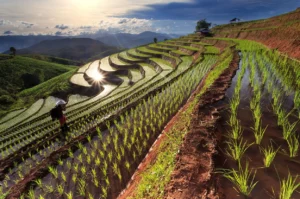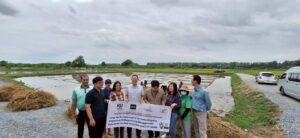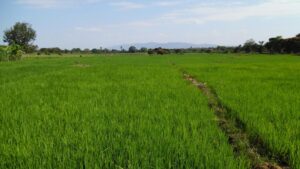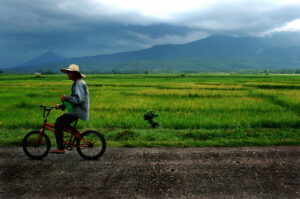by Ranjitha Puskur
Some women from the Adarsh Dharamagarh Women Farmers Services Producer Company, incubated by the International Rice Research Institute and Access Livelihoods, participated in the 9-month Women Entrepreneurship Program (WEP). These are the success stories of two of those women.
Fueled by inner passion, Kusadei aims to become a businesswoman

Unhindered by hurdles and unaffected by discouragement from family members, Kusadei started her shop at merely 20 years of age without taking any loan. All she had was the passion to be financially independent. Today, at 24, she is successfully running her own seed and fertilizer business.
Living in Kundamal, a small village in the Dharamgarh District of Kalahandi, she went to school only until Grade 12. In 2017, while working in their fields to help her father, she became interested in good farming techniques and increasing production to improve their income. She started looking for opportunities to expand her knowledge when she came across Adarsh Dharamagarh Women Farmers Services Producer Company Limited where she eventually became a mobilizer.
“I always wanted to know more about the production process and farming,” she says. “My father practices traditional methods, but I believed we could earn more if we followed new practices. I wanted to learn and share with my father. I wanted to earn independently to support my family and my dream. My dream was fulfilled after I joined WEP.”
She started her shop in June 2019 while participating in WEP. She used the lessons she learned from the course to establish her own business.
“I never missed any classes as it gave me immense knowledge and the confidence to start something independently,” she says. “I learned the principles of accounting and bookkeeping, the importance of understanding the market, product, and place. and the supply and value chain. I used all that in my business.”
She observed that farmers from her village travel 4-5 km to buy seeds and fertilizers, which adds to their production cost and incurs additional time and effort. She envisaged starting a seed and fertilizer shop in her village as she learned how location and product matter in business.
With the help of a friend, she contacted a distributor at Junagarh. She negotiated with the distributor to deliver stocks, worth Rs 1 lakh (about USD 1,250), to her village with a 50% advance payment instead of the 70% normally required by distributors. The distributor also provided her with information and knowledge about various seeds and pesticides. Then she started her shop from her home.
When Kusadei opened her business, she needed to spread information about her shop to attract customers. She went to Self-Help Group (SHG) and farmers’ meetings to promote her shop. She pegged the selling prices of seed at 40% above her cost price, including transportation and labor, and urea at 18.5% to 50% during the peak season.
She sold all her stocks in five days and was able to pay back the remaining 50% to the distributor. With the confidence she gained from her initial success, she acquired more stocks.
At the age of 21, she earned her first Rs 15,000 (USD 180.00) independently within a week. This was also the first time a young woman in her community was engaging in a business.
She made a profit of Rs 20,000 to Rs 35,000 (USD 240-420) in four months when there was demand for fertilizers and seeds. She also works in the producer company and earns around Rs 75,000 (USD 1,000) yearly.
In 2021, she earned Rs 35,000 (USD 420) from her shop. She invested Rs 1,20,000 (USD 1,450) in her shop, for which she borrowed Rs 50,000 (USD 625) from her family and the rest from her earnings. Today, she runs her shop in a rented room and owns a scooter bought with her own money.
Her entrepreneurship journey involved a lot of hard work. She used marketing strategies to grab a share of the market. She offered to replace seeds if they did not germinate well. She visited farmers’ fields to identify pests and provide management advice. She stocked up on materials to make them available in time for the peak-demand season.
When she started, hers was the only shop selling seeds and fertilizers in the village but, recently, a competing shop was set up. Another challenge was the lack of support from her family and relatives. Although they never stopped her from running a business, they often told her that, being a girl, she should get married instead of roaming around doing business.
“I benefited immensely from being a mobilizer and participating in WEP,” she says. “The family income also increased because of better production practices. I received training from the distributor to identify pests and the suitable pesticides for them. The same knowledge proved to be beneficial for my own field.”
The family income from farming their 1.2-hectare land is Rs 1 lakh (about USD 1,250), after keeping a few bags of paddy for home consumption. She said that there has been a 30% increase in income after using good quality seed and improved agricultural practices.
Kusadei is taking baby steps to fulfil her goal of becoming a successful businesswoman. She wants to generate employment opportunities for people in her village by starting new businesses.
She believes her secret to success is her eagerness to gain knowledge and keep looking for new ideas.
“I always try to learn as much as I can,” she said. “I also want to attend the Women Entrepreneurship classes again to refresh everything I learned. It already helped me start my shop and it will enable me to implement new ideas like establishing a spice packaging unit or a washing powder manufacturing unit in future.”
Financial independence leads to empowerment

Mamta Pandey from Musapali, a small village in the Dharamgarh Block of Kalahandi District, was like any other woman in the area until she became a mobilizer for the producer company.
She completed her 12th grade and was married off at 18. She spent the next ten years engaged in household chores and helping the family in agricultural activities like weeding and harvesting paddy.
Things started to change for her when she became a mobilizer in the village for the formation of Adarsh Dharamgarh Women Farmers Services Producer Company Limited. In one of the initial meetings, after learning about the producer company, she requested permission from her in-laws and husband to become a mobilizer.
At first, her in-laws didn’t accept the idea of her going door-to-door mobilizing people but received the support of her husband. Initially, she only wanted to work in nearby areas and earn some income of her own but after being trained she became motivated to empower herself and support other women to do the same.
After the producer company was formed in her village, she became one of its Board Directors. Then she attended WEP.
“At WEP, I learned about leadership, business, accounting and market,” she said. “ I also gained a lot of confidence and can now talk to people without fear. Most importantly, I learned the importance of determination. Failures should not stop you from trying again and again. A facilitator said it is okay to fail in business; profit and loss are part of the business. If I had not joined the program, I would have never believed in the motto of try and try again till you succeed.”
She applied the same principles in her daily life, too. She started multiple businesses, and the failures didn’t hinder her from persisting.
She started a poultry business in 2021 where she invested Rs 2 lakhs (USD 2,400) she borrowed from her family. She constructed a poultry shed. After one year, she broke even, but had to close it due to a lack of electricity at her facility. She used solar lighting, which was damaged by wild animals.
That didn’t deter her from starting another enterprise. She dug a pond in the backyard of her house and invested Rs 1.30 lakh (USD 1,570) of which she received about 50% subsidy from a government scheme, which she learned about from the Block Veterinary Department. The fish will be ready to be harvested in December 2022 -January 2023. She has already identified a trader who will buy the fish from her homestead.

In addition, she started a banking kiosk. The nearest bank is about 15 km away from her village and her community members, especially the older ones, face a lot of difficulties in availing banking services. Using a biometric gadget and an ATM card she conducts online transactions, withdraws cash, and provides the residents of her village cash when they need it without having to travel. She earns Rs 10 for each Rs. 1,000 transfer.
Today, Mamta earns Rs 12,000 – 15,000 (USD 145-180) per month. She is also the president of her SHG group and works as a bookkeeper. She feels empowered earning money independently.
“After joining the producer company and undertaking the course, I could also become a bookkeeper in a self-help group by showing my certificate,” she said. “Earlier I had to ask my husband for the simplest of things like bangles and sarees, and sometimes he refused to buy them. But today, as I earn my own money, not only can I buy the things on my own but also buy clothes for my children and contribute towards household expenses.”
Her path to empowerment can be gauged by the fact that she led a successful campaign to eradicate liquor sales in her village. She plans to establish a shop selling solar lights and with a photocopying machine so that people from her village do not need to travel to the nearest town for these.
“There has been an immense change in how people treat me today,” she says. “My in-laws are also encouraging me to go out and work. There was a change in their mindset when they heard the villagers praising my work and appreciating how the mobilization and being associated with the FPC as a board member is helping the farmers. There was a time when I was nervous about going out of my house, and now I get invited to various meetings—my opinion today matters. Even my kids say they will manage their things and I should go out and work. That makes me feel so proud of myself.”










Very encouraging case. FPC and their working together with member farmers (women and men), rural entrepreneurs and local traders is very effective to meet farmers needs for agri inputs in time, quality and lower prices, and link market outputs to right trades/markets at a better prices. We see similar cases in our Village Seed System activities in Odisha state.
Nicely documented case by Dr Ranjitha.